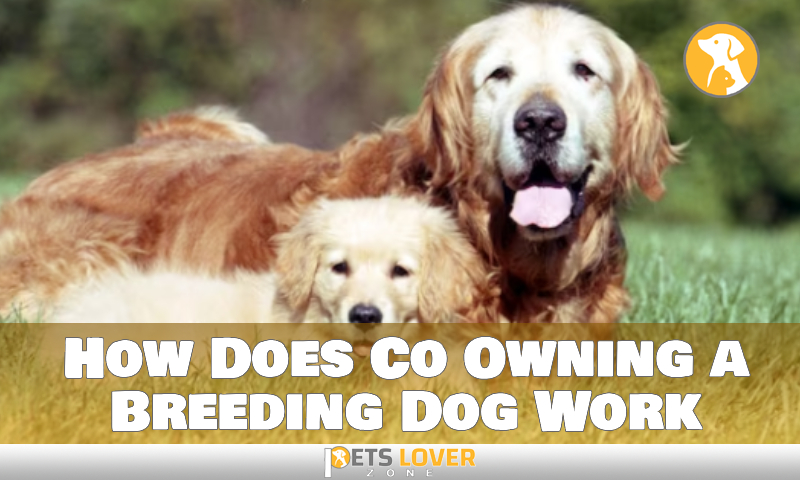Co owning a breeding dog involves two or more individuals sharing the responsibility and costs of breeding. It allows for shared decision-making, financial burden, and breeding rights for offspring.
Co owning a breeding dog can be an exciting venture for dog enthusiasts looking to expand their breeding program or simply share the joys and responsibilities of owning a dog. This arrangement involves multiple individuals coming together to jointly own and care for a breeding dog, pooling their resources and expertise.
Co owning a breeding dog allows for shared decision-making on matters such as breeding schedules, genetic pairings, and the overall well-being of the dogs involved. It also helps distribute the financial burden that comes with breeding, as costs for veterinary care, grooming, and marketing can be divided among the co owners. Moreover, each co owner typically enjoys the right to breed the dog and claims ownership of a certain percentage of the litter’s offspring. By co owning a breeding dog, enthusiasts can collaborate, learn from each other, and strengthen their breeding program while ensuring the dog’s welfare and success in the breeding industry.
Understanding Co Ownership

Co owning a breeding dog is a unique arrangement where two or more individuals share the responsibilities and benefits of owning a dog. The concept of co ownership involves joint or shared ownership of the dog, as well as the responsibilities and costs associated with breeding and raising puppies.
Co ownership can have various definitions depending on the specific agreement between the co owners. The main benefit of co owning a dog is that it allows individuals to share the costs and responsibilities, making it more manageable and affordable.
However, it’s crucial to establish clear communication and guidelines regarding decision-making, breeding rights, and financial arrangements. Co owners must work collaboratively to ensure the health, well-being, and success of the breeding dog. This includes proper care, training, health screenings, and finding suitable homes for the puppies.
Co Ownership Agreements
Co owning a breeding dog involves a co ownership agreement, which is of utmost importance. This agreement outlines the terms and conditions between the parties involved and ensures a smooth partnership. In a co ownership agreement, it is vital to include details about the responsibilities and rights of each owner, including financial obligations and decision-making processes.
Legal considerations also play a significant role in such agreements, as they provide protection and clarity in the event of disputes or unforeseen circumstances. A well-crafted co ownership agreement should address aspects such as breeding rights, health testing, show requirements, and potential conflicts.
By having a comprehensive and legally binding agreement in place, co owning a breeding dog can be a successful and mutually beneficial endeavor for all parties involved.
Co Ownership Arrangements
Co owning a breeding dog can be a beneficial arrangement for both parties involved. Prospective co-owners should be evaluated carefully, to ensure compatibility. When searching for a co owner, it is important to find someone with similar goals and values.
Evaluating potential co owners can involve conducting interviews and thorough background checks. Once a suitable co owner is found, selecting the right co ownership arrangement is crucial. A clear and comprehensive contract should be drafted, outlining responsibilities, financial agreements, and any breeding restrictions.
Effective communication and trust are key to maintaining a successful co ownership arrangement. Owning a breeding dog together can provide shared expenses, breeding opportunities, and companionship. With proper planning and understanding, co owning a breeding dog can be fulfilling and rewarding for both parties involved.
Co Ownership Financials
When it comes to co-owning a breeding dog, it is important to understand how the finances work. Shared costs and expenses are a crucial aspect of co-ownership. This includes revenue sharing and breeding fees, which are divided between the parties involved.
It is essential to have clear agreements on how the revenue will be shared to avoid any financial disputes. In addition, managing financial disputes can be challenging but necessary to maintain a healthy co-ownership relationship. Open communication and transparency regarding expenses and revenue are key to ensuring a smooth financial arrangement.
Co-owners should have a clear understanding of their shared responsibilities and be willing to work together to resolve any financial conflicts that may arise. With a solid financial plan and effective communication, co-owning a breeding dog can be a successful and mutually beneficial venture.
Co Parenting A Breeding Dog
Co-owning a breeding dog involves sharing responsibilities for care and training. It requires effective communication and decision-making. Challenges may arise, but they can be overcome through collaboration and compromise. Working together, co-parents must establish clear guidelines for feeding, exercise, grooming, and healthcare.
Consistent training methods are crucial to ensuring the dog’s well-being and behavior. Regular communication is essential to discuss any issues or changes in the dog’s routine. Decision-making regarding breeding, medical treatments, and other significant matters should be made collectively. Transparency and trust are keys to a successful co-parenting arrangement.
Despite the potential challenges, co-owning a breeding dog can be a rewarding experience when cooperation and teamwork are prioritized. By sharing the responsibilities, co-parents can provide a loving and stable environment for their precious canine companion.
Breeding And Co Ownership
Breeding and co-ownership of dogs involve careful planning of breeding cycles and the selection of stud dogs or sires. Coordinating breeding activities is crucial for successful outcomes. Breeding cycles need to be planned in advance, considering factors such as the female dog’s heat cycle and optimal timing.
Selecting the right stud dog or sire is another important decision, taking into account genetic traits, health screenings, and compatibility with the female. Co-owners have to work together to ensure proper care, nutrition, and veterinary support throughout the breeding process.
Communication and coordination are key to managing the logistics of mating, transportation, and whelping. Maintaining open and transparent communication helps co-owners collaborate effectively and ensure a healthy and successful breeding experience. Breeders should put thorough thought and effort into each step of the process to increase the chances of producing healthy, quality puppies.
Managing Breeding Dog Health
Co owning a breeding dog requires careful management of its health. Veterinary care is essential, but it comes at a cost. Preventative measures like vaccinations are crucial for maintaining the dog’s well-being. Regular check-ups and screenings can help address any potential health concerns.
In a co ownership arrangement, it is important to establish a plan for sharing the expenses related to veterinary care. It is recommended to have a clear understanding of the responsibilities and costs involved. Taking proactive steps to maintain the breeding dog’s health will contribute to a successful co ownership experience.
By prioritizing veterinary care and addressing health concerns promptly, co owners can ensure the well-being of their breeding dog.
Addressing Breeding Dog Retirement
Co-owning a breeding dog involves careful planning for their retirement. Retirement plans encompass the responsibilities of transitioning ownership and ensuring a comfortable post-breeding life for the dog. As co-owners, it is crucial to discuss the process of retiring the dog and agree on the best course of action.
Transferring ownership or exiting the co-ownership arrangement should be done thoughtfully and with the dog’s well-being in mind. Retirement should not mean neglecting the dog’s needs but rather providing a nurturing environment. It is important to consider factors such as the dog’s health, living conditions, and socialization.
By actively participating in their retirement plans, co-owners can ensure that their breeding dog enjoys a fulfilling and peaceful retirement after years of dedicated service.
Resolving Co Ownership Disputes

Co owning a breeding dog can be a complex arrangement. Resolving disputes related to co ownership requires strategic approaches. One option is pursuing legal avenues or seeking mediation. Both methods can offer effective conflict resolution. The key is to protect the best interests of the dog throughout the process.
By considering legal options, individuals can gain clarity on their rights and responsibilities. Mediation, on the other hand, provides a neutral space for the parties involved to discuss their concerns and find common ground. Ultimately, the goal is to ensure that the breeding dog is well cared for and that any conflicts are resolved in a fair and mutually beneficial manner.
FAQ
What Does The Male Dog Owner Get When Breeding?
The male dog owner can benefit from breeding by earning money through stud fees.
What Is A Co Breeder?
A co-breeder is someone who collaborates with another breeder to raise and breed animals together.
How Do Dog Breeding Contracts Work?
Dog breeding contracts outline the terms, obligations, and responsibilities of both the breeder and the buyer – including health guarantees, breeding restrictions, and ownership transfer.
Conclusion
Co-owning a breeding dog can be a beneficial arrangement for those who are passionate about breeding but want to share the responsibilities and costs. This type of partnership allows individuals to combine their skills, knowledge, and resources to produce high-quality puppies while also reducing the workload and financial burden.
By setting clear expectations and maintaining open communication, co-owners can effectively work together to ensure the well-being and success of their breeding dog. It is essential to establish a strong relationship based on trust, respect, and shared values to maintain harmonious co-ownership.
Proper documentation and legal agreements are vital to protecting the interests of both parties involved. Ultimately, co-owning a breeding dog can be a rewarding experience that allows breed enthusiasts to collaborate and achieve their breeding goals while sharing the joys and challenges that come with raising and producing healthy, well-bred puppies.






